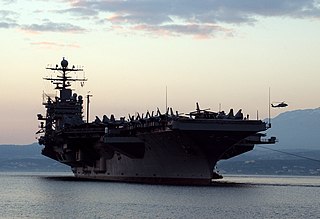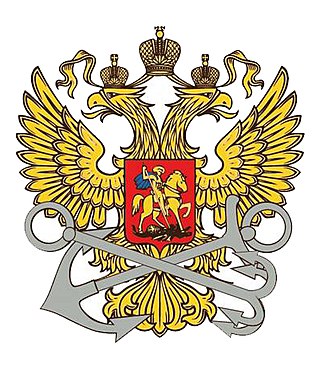Related Research Articles

Maritime transport or more generally waterborne transport, is the transport of people (passengers) or goods (cargo) via waterways. Freight transport by sea has been widely used throughout recorded history. The advent of aviation has diminished the importance of sea travel for passengers, though it is still popular for short trips and pleasure cruises. Transport by water is cheaper than transport by air or ground, but significantly slower for longer distances. Maritime transport accounts for roughly 80% of international trade, according to UNCTAD in 2020.
The United States Armed Forces are the military forces of the United States. The armed forces consists of six service branches: the Army, Marine Corps, Navy, Air Force, Space Force, and Coast Guard. All six armed services are among the eight uniformed services of the United States.

The United States Coast Guard (USCG) is the maritime security, search and rescue, and law enforcement service branch of the United States Armed Forces and one of the country's eight uniformed services. The service is a maritime, military, multi-mission service unique among the United States military branches for having a maritime law enforcement mission with jurisdiction in both domestic and international waters and a federal regulatory agency mission as part of its duties. It is one of the largest and most powerful coast guards in the world, rivaling the capabilities and size of most navies.

A coast guard or coastguard is a maritime security organization of a particular country. The term embraces wide range of responsibilities in different countries, from being a heavily armed military force with customs and security duties to being a volunteer organization tasked with search and rescue without law enforcement authority. In most countries, a typical coast guard's functions are distinct from those of the navy and the transit police, while in certain countries they have similarities to both.

Search and rescue (SAR) is the search for and provision of aid to people who are in distress or imminent danger. The general field of search and rescue includes many specialty sub-fields, typically determined by the type of terrain the search is conducted over. These include mountain rescue; ground search and rescue, including the use of search and rescue dogs ; urban search and rescue in cities; combat search and rescue on the battlefield and air-sea rescue over water.

The Canadian Coast Guard is the coast guard of Canada. Formed in 1962, the coast guard is tasked with marine search and rescue (SAR), communication, navigation, and transportation issues in Canadian waters, such as navigation aids and icebreaking, marine pollution response, and support for other Canadian government initiatives. The coast guard operates 119 vessels of varying sizes and 23 helicopters, along with a variety of smaller craft. The CCG is headquartered in Ottawa, Ontario, and is a special operating agency within Fisheries and Oceans Canada.

The United States Maritime Administration (MARAD) is an agency of the United States Department of Transportation. MARAD administers financial programs to develop, promote, and operate the U.S. Maritime Service and the U.S. Merchant Marine. In addition it conducts research and development activities in the maritime field; regulates the transfer of U.S. documented vessels to foreign registries; maintains equipment, shipyard facilities, and reserve fleets of Government-owned ships essential for national defense.
Its programs promote the use of waterborne transportation and its seamless integration with other segments of the transportation system, and the viability of the U.S. merchant marine. The Maritime Administration works in many areas involving ships and shipping, shipbuilding, port operations, vessel operations, national security, environment, and safety. The Maritime Administration is also charged with maintaining the health of the merchant marine, since commercial mariners, vessels, and intermodal facilities are vital for supporting national security, and so the agency provides support and information for current mariners, extensive support for educating future mariners, and programs to educate America's young people about the vital role the maritime industry plays in the lives of all Americans.
Responsibilities for traditional coast guard duties in Australia are distributed across various federal, state and community agencies. The de facto coast guard of Australia is the Maritime Border Command, a joint command of the Australian Defence Force and the Australian Border Force which works alongside the Australian Federal Police, the Australian Fisheries Management Authority, and the Australian Maritime Safety Authority. Each state and territory government have specific maritime safety agencies and police marine units. In addition, there are several private volunteer coast guard organisations which act as auxiliary search and rescue services and maritime safety educators with the largest organisations being the Royal Volunteer Coastal Patrol established in 1937, the Australian Volunteer Coast Guard established in 1961, and Marine Rescue New South Wales established in 2009.

Water police, also called harbor patrols, port police, marine/maritime police, nautical patrols, bay constables,river police, or maritime law enforcement or coastal police are police officers, usually a department of a larger police organization, who patrol in water craft. Their patrol areas may be coastal sea waters, rivers, estuaries, harbors, lakes, canals or a combination of these.

The Port of Hong Kong, located by the South China Sea, is a deepwater seaport dominated by trade in containerised manufactured products, and to a lesser extent raw materials and passengers. A key factor in the economic development of Hong Kong, the natural shelter and deep waters of Victoria Harbour provide ideal conditions for berthing and the handling of all types of vessels. It is one of the busiest ports in the world, in the three categories of shipping movements, cargo handled and passengers carried. This makes Hong Kong a Large-Port Metropolis.

The Philippine Coast Guard (PCG) is recognized as the third armed uniformed service of the country attached to the Philippines' Department of Transportation, tasked primarily with enforcing laws within Philippine waters, conducting maritime security operations, safeguarding life and property at sea, and protecting marine environment and resources; similar to coast guard units around the world. In case of a declaration of war, the Coast Guard shall also serve as an attached service of the Department of National Defense.

The Hellenic Coast Guard is the national coast guard of Greece. Like many other coast guards, it is a paramilitary organization that can support the Hellenic Navy in wartime, but resides under separate civilian control in times of peace. The officers and the enlisted members of Coast Guard are regarded as military personnel under Military's Penal Code. It was founded in 1919 by an Act of Parliament and the legal framework for its function was reformed in 1927. Its primary mission is the enforcement of Greek, European and International law in the maritime areas.

Coast Guard Intelligence (CGI) is the military intelligence branch of the United States Coast Guard, and a component of the Central Security Service of the United States Department of Defense.
The United States Coast Guard is the coastal defense, search and rescue, and maritime law enforcement branch of the United States Armed Forces and is one of the country's eight uniformed services. It carries out three basic roles, which are further subdivided into eleven statutory missions. The three roles are:

The Joint Maritime Training Center (JMTC), also known as the Special Missions Training Center (SMTC), is a joint United States Coast Guard, Navy, and Marine Corps training facility located on Camp Lejeune, North Carolina. JMTC's mission is to provide relevant and credible Maritime Security Training and Operational Testing and Evaluation in support of Department of Defense and Department of Homeland Security missions. JMTC comprises four main divisions: Weapons, Port Security, Engineering / Logistics, and Fast Boat.

Navy Expeditionary Combat Command (NECC) serves as the single functional command to centrally manage current and future readiness, resources, manning, training and equipping of the United States Navy's 21,000 expeditionary forces who are currently serving in every theater of operation. The NECC was established in January 2006. NECC is a subordinate command of the Navy's Fleet Forces Command.
A Sector is a shore-based operational unit of the United States Coast Guard. Each Sector is responsible for the execution of all Coast Guard missions within its Area of Responsibility (AOR), with operational support from Coast Guard Cutters and Air Stations. Subordinate commands within a Sector typically include Stations and Aids-to-Navigation (ATON) Teams. Some Sector commands also have subordinate units such as Sector Field Offices and Marine Safety Units that are responsible for mission execution in parts of the Sector's AOR. There are 37 sectors within the Coast Guard.

Jersey Coastguard is responsible for the safety of life at sea along with the security and protection of the maritime environment for Jersey’s territorial waters. The service is provided by the Ports of Jersey from the Maritime Operations Centre in Maritime House in the port of St Helier, Jersey.

Crete Naval Base is a major naval base of the Hellenic Navy and NATO at Souda Bay in Crete, Greece.

The Federal Agency for Maritime and River Transport (Rosmorrechflot), is a federal executive body in Russian Federation. It is entrusted to manage state property, maintain transport security-related tasks and provide services in the field of maritime and inland waterway transport. It is under the jurisdiction of the Ministry of Transport of the Russian Federation.
References
- ↑ http://www.marineandports.bm/Departments.aspx?DeptID=4&DeptName=Maritime%20Operations%20Centre. Department of Marine and Port Services. 2 February 2012. Accessed 25 April 2012.
